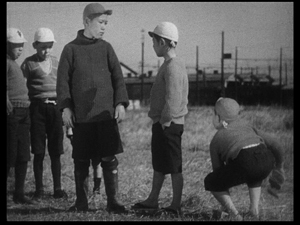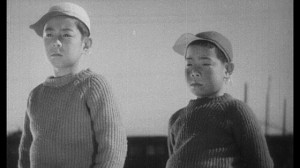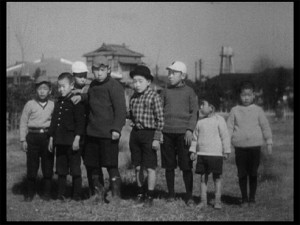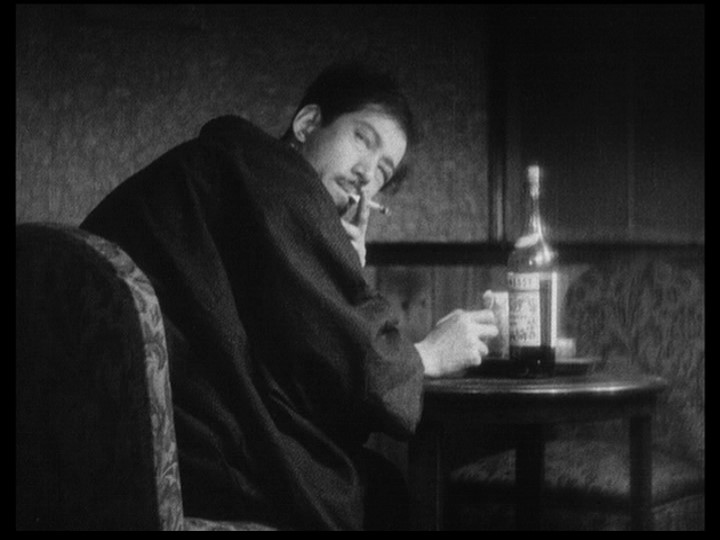From Monthly Film Bulletin, February 1975 (Vol. 42, No. 493). — J.R.
Umarete wa Mita Keredo (l Was Born, But . . .)
Japan, 1932 Director: Yasujiro Ozu
Yoshi moves with his wife and two sons, Ryoichi and Keiji, from
Azabu to a Tokyo suburb, close to the home of the director of the
company where he works. His sons are ostracized and persecuted
by the other boys in the neighborhood; arriving late for school
after Yoshi urges them to get high marks, they decide to play
hooky and do their lessons in a nearby field, forging high marks on
their papers which they bring home to show their father. But Yoshi
is informed by Ryoichi’s teacher that they were absent from school,
and makes sure that they attend the following day. After a delivery
boy whom they befriend overpowers a bully who previously
defeated Keiji, the boys are accepted as leaders by their local
schoolmates. Yoshi’s boss screens home movies for his family
and friends, including his son Taro, Yoshi, Ryoichi and Keiji;
the latter two are horrified when they see Yoshi making faces and
otherwise demeaning himself in the films to please his boss, and a
family fight ensues after they and their father return home. When
Ryoichi insists that Yoshi shouldn’t accept a salary from his boss,
Yoshi replies that he has to in order for them to eat. His sons
respond by going on a hunger strike, and Ryoichi is spanked by
Yoshi after throwing objects on the floor; both sons go off in tears.
In the morning, Yoshi asks his wife to fix them rice balls — which
they are eventually persuaded to eat — and, as usual, walks with
them part of the way to school. They meet Yoshi’s boss with Taro,
and after a moment of embarrassment Ryoichi advises his father
to greet him; Yoshi and his boss leave for work in the latter’s car,
while Ryoichi, Keiji, Taro and the other local boys depart for
school.
During the home movie projection which marks the critical
turning point in I Was Born, But . . . from comedy to tragedy, and
shortly before Yoshi’s antics appear on the inner screen, Ryoichi
and Keiji break into a debate about the zebra they see — does it
have black stripes on white, or white stripes on black? — creating
a disturbance that momentarily halts the screening. In comparable
fashion, a spurious, distracting and no less innocent debate has
been persisting for years about Ozu: is he a realist or a formalist?
The naïveté of such a question (and the related fallacy that
‘realism’ and ‘stylization’ are somehow alternative choices) has
effectively blinded many to Ozu’s genius, as well as Tati’s: whether
uncritically embraced for their ‘simple’ humanism or dismissed
for their ‘cold’, ‘boring’ or elusive’ formalism, the brilliance of
both is lost on a one-eyed public that wants to keep its pleasure
simple. If a demonstration is needed that cinematic and social
forms are so interrelated for Ozu that they become indistinguishable,
I Was Born, But . . . is there to supply it — along with strong
counter-evidence to the charge that his total absorption in the
commonplaces of middle-class suburbia reflects a reactionary
endorsement of its principal values. Because the society that Ozu
depicts is essentially bound up in formality, it naturally follows that
his sense of this society’s boundaries and limitations is intimately
related to its ritual social gestures: Ohayo (Good Morning), his
1959 ‘remake’, pivots around the boys’ questioning of why people
say “Good morning” to one another. And even more clearly in this
1932 silent version, Ozu is implicitly offering a radical critique of
prevailing social as well as cinematic forms, although the
boundaries of his world — like those of Oshima’s in Boy — ultimately
make it a tragic vision. Learning to master their immediate social
environment by establishing their power to humiliate others,
Ryoichi and Keiji are brought to the chilling realization that their
father’s power — which hangs over and determines their very
existence — is based on his capacity to be humiliated. Every formal
aspect of the film expresses the equivalence of and continuity
between the separate worlds inhabited by Yoshi and his sons:
two lateral tracking shots in opposite directions across a line of
schoolboys marched through drills is followed by another ore
proceeding back and forth across desks of yawning employees in
Yoshi’s office, with teacher and boss playing comparable roles in
the compositions. Low-angle shots from the boys’ eye level are
intercut with higher shots favoring Yoshi as he lectures them
(while undressing) on getting high marks; this ‘authoritarian’ view
is undercut and counterpointed by a less heroic shot of his ungainly
socks as seen by his sons. The routes to work and school partially
coincide as he walks with them beside railroad tracks to the crossing
(a path traversed many times in the film), where he departs in his
boss’ sedan and the kids (including Taro) join the others. The
field crossed on the latter’s route is where the boys do their
schoolwork when playing hooky, and parallel tracking shots link the
two there with the arrival of the delivery boy, from whom they ask
help in forging their high marks — an emissary between their world
and their parents’ who later protects them against the local bully in
‘exchange’ for the news that their mother will order beer because
it’s Father’s payday. And this same bully, moreover, is glimpsed
running ahead of his schoolmates in the film’s penultimate shot,
going out of his way to greet his teacher a second time. Indeed, if
the climactic family crisis registers with an explosive force —
Ryoichi screaming “I’m not afraid of you. You’re a nothing
you’re a nobody”, and getting brutally spanked after further
violence, followed by Yoshi telling his wife ”l give up”, and taking
out his liquor bottle — this is partially because everything preceding
it has led to this awful impasse. Even in the print under review —
evidently running short of the ‘original’ 89 minutes listed in some
sources or the 100 suggested by another — the extraordinary unity
of Ozu’s conception lends relevance and resonance to every fleeting
detail, so that neither the above synopsis nor any abbreviated
charting of relationships can begin to describe the film’s richness,
or the potential impact of its theme. Writing in Moviegoer nearly
a decade ago, James Stoller remarked that “it invites comparisons
to Vigo, but has charm and physical grace and density that eluded
the Frenchman; it surpasses Vigo’s schoolboy anarchy with its
sad, Olympian intimations not only of the spirit but of the closing
in of the culture upon it, of the absolute necessity of compromise
and the denial of animal will”.
JONATHAN ROSENBAUM




